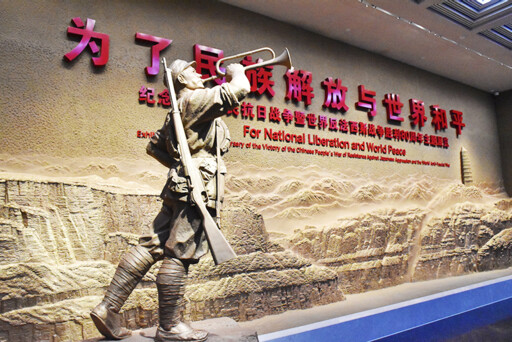


Int’l scholars call for upholding outcomes of WWII victory

An ongoing exhibition themed “For National Liberation and World Peace” at the Museum of the War of Chinese People’s Resistance Against Japanese Aggression in Beijing Photo: IC PHOTO
Aug. 15, 2025, marks the 80th anniversary of Japan’s unconditional surrender in WWII. Eighty years ago, this historic moment signaled the long-awaited triumph of the 14-year Chinese People’s War of Resistance Against Japanese Aggression and the World Anti-Fascist War (1931–45). To explore the international significance of this victory, CSST recently interviewed several scholars from Germany and Serbia.
Reshaping global geopolitics
Reflecting on the implications of the anti-fascist struggle for world history, German publisher and writer Frank Schumann told CSST that the military defeat of German and Japanese fascism fundamentally changed the world in geopolitical terms.
“This conflict led to the majority of the world’s population joining forces to put declared enemies of humanity in their place. This was a fundamental experience that remains true today: Together, the peoples of the world can enforce peace!” Schumann asserted. “In this existential conflict, humanity realized that we are all in the same boat—only together can we survive. Or perish.”
The Chinese People’s War of Resistance Against Japanese Aggression was a war involving the whole nation, for which the CPC served as the backbone. Mechthild Leutner, a professor emeritus from the Freie Universität Berlin in Germany, emphasized that the CPC played an extremely important role in combating Japanese aggression in China, uniting and leading the Chinese people to defend their country and fight for social liberation.
“This connection between national defense and social liberation was the decisive factor in the victory against the aggressors and their collaborators,” Leutner remarked.
Non-Western perspectives essential
Due to the predominance of Western-centric perspectives, the historical significance and global contributions of the Eastern theater have long been underestimated. To address the ongoing challenge of correcting biased WWII narratives and reshaping historical discourse, Leutner urged historians, politicians, and media representatives to incorporate non-European perspectives into research and remembrance culture in Western countries as well, thus highlighting the contribution of non-Western countries to the victory over fascism worldwide.
Aleksandar Mitić, a research fellow from the Center for the Belt and Road Studies at the Institute of International Politics and Economics in Belgrade, Serbia, noted that the armed struggle witnessed the resilience and the immense suffering of the Chinese people. “However, this is often overlooked in the Western world, particularly in the political world, mainstream media, and popular culture. Such relativization has had extremely negative consequences and has opened the door to unjustified and dangerous revisionist forces.”
Addressing challenges from historical revisionism
Today, the clamor of historical revisionism and nihilism continues to spread. Certain extremists obstinately deny the atrocities committed by fascist aggressors. In essence, these ideologies seek to deny, distort, and suppress historical truth—standing in direct defiance of the rightful tide of history.
Discussing the pattern of unjustified historical revisionism based on the relativization of crimes committed by fascist forces, Mitić affirmed that some forces attempt to undermine the consensus of human peace by deconstructing WWII history and downplaying fascist crimes: In Japan, right-wing politicians visit Yasukuni Shrine from time to time; in the United States, some glorify aggressive acts as “strategic deterrence”—these practices constitute blatant violations of historical justice.
“This historical revisionism also resonates with populism and extremist nationalism, eroding the foundation of common values of the international community,” Mitić said.
Historical facts and archival records serve as indisputable sources of evidence. Leutner pointed out that the horrific war crimes committed by the Nazis in Europe and the Japanese army in Asia are now well documented by scholars. “It is essential that the commemoration of these crimes be maintained and kept alive in the present day. In particular, it is important to highlight the origins of the war, a war that was driven by both political power interests and economic profit interests. Only in this way can new armament and war rhetoric be effectively opposed in the present day.”
“Especially in view of the painful experiences of the World War with its tens of millions of deaths, it is important to learn from these experiences and to bring the necessity of peaceful cooperation between all people and the peaceful resolution of conflicts back to the forefront of politics and diplomacy,” Leutner added.
For Schumann, promoting education with an accurate understanding of history is crucial to countering historical nihilism. “It is about conveying a true picture of the past in all areas of society and by all means, especially through culture: books, films, theater, museums, honoring veterans and fallen anti-fascist resistance fighters, scientific reappraisal of history, critical examination of all relevant events of the past, both positive and negative. History is not just about victories. It also includes defeats,” he said.
Editor:Yu Hui
Copyright©2023 CSSN All Rights Reserved